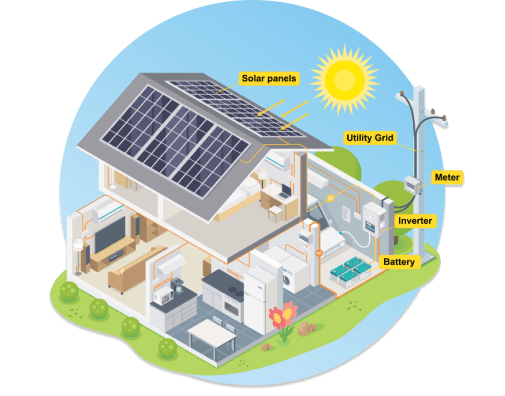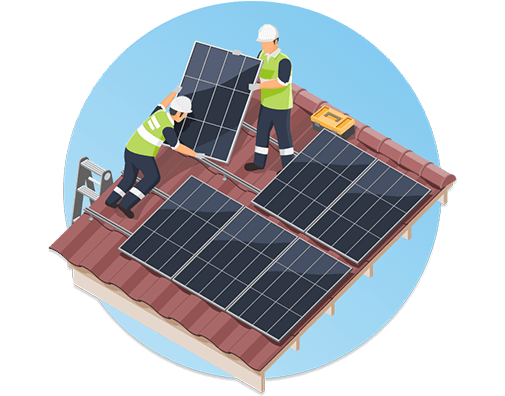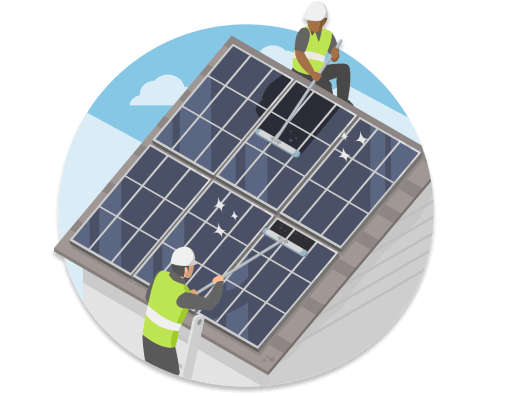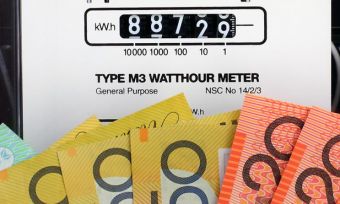There are three main kinds of solar cells that make up the commonly used types of solar panels in Australia: monocrystalline, polycrystalline and thin film. Panels with monocrystalline solar cells, also known as mono panels, are generally considered to have the highest efficiency because their cells are sliced from larger silicon crystals. Efficiency in solar panel terms typically means the amount of electricity a panel can generate given the amount of space it takes up. You can identify mono panels because their cells look like squares with all four corners cut off.
Panels with polycrystalline cells – you guessed it, known as poly panels – are slightly less efficient because they’re created from pouring silicon into a mould rather than to cutting crystals to make cells. The pour method for polycrystalline cells is typically cheaper than the cutting method for monocrystalline cells, making poly panel types slightly cheaper to purchase.
Panels with thin film cells are made by spraying a layer of silicon onto a panel surface. These panels are considered to be the heaviest of the three kinds of solar panel and are generally less efficient than both monocrystalline panels and polycrystalline panels. But thin film solar cells are significantly cheaper to produce than both mono and poly panels.
Solar panels usually hold 60 solar cells but can also commonly have 72 solar cells and there are panels with as few as 32 cells. The more cells a panel holds, the larger the panel is and the more electricity the panel can generate given its cell type. Solar panels house the cells within a glass casing that’s contained by a metal frame. Those are the structures you see on your neighbour’s roof!
Solar panels work by using a chemical reaction known as the photovoltaic effect (PV). ‘Photo’ means light and ‘voltaic’ means electricity. All types of solar cell – mono, poly and thin film – are PV cells. Silicon, which the cells are made of, is a semi-conductor, which means that it can conduct electricity. In simple terms, when the PV cells are exposed to photons, which is the word for particles of sunlight, they release electrons. That means the energy of the photos has been effectively transferred to the semi-conductor, which is the silicon the cells are made of. The electrons flow in a particular direction and that’s called a current. This type of current is a direct current (DC). The DC current is sent to your solar system’s inverter to be converted into an alternating current (AC) for use in your home.
The full story of how solar panels work is, of course, much more complex than we’ve described above. We like How Stuff Works’ deep dive into how solar panels work for a (relatively) easy to read explanation.

The cost of a solar panel – or, in almost all cases, panels – depends on the panel size, brand and quality of product and geographical location of your installation. Some factors that may impact this final cost also include choosing between a black or blue celled solar panel, picking a tier 1, tier 2 or tier 3 solar panel, what government solar rebates you can access and even how suitable your roof is for solar panel installation.
Alongside the solar panel price, you’ll also need to consider the costs for the overall installation of a solar system, including an inverter and potentially a solar battery too, which will come at an additional cost.
A Canstar Blue survey conducted in December 2022 found that the average solar panel cost in Australia was $5,667. This was the cost reported by survey respondents who hadn’t purchased their home solar panels as part of a solar package.
There are several things to consider when choosing a solar panel installer for your residential solar panels and system. The first of these is the company’s expertise, experience and certifications. A solar installation is a significant financial investment, so ensuring your solar installer is all of the above is only sensible. Ask solar installers you contact for a quote about their qualifications, such as if they’re a New Energy Tech Approved Seller, how many installations they’ve performed and how many years they’ve been in the business. It’s fine to ask to talk to previous customers or to see some examples of completed installations.
Other than expertise and longevity, it’s wise to understand what support an installer offers before, during and after your solar installation. Will you be able to contact the company if something happens to your solar system in the future, particularly via a dedicated helpline? Knowing your options prior to booking your installation may avoid hassle later if you have a problem with your solar installation – or, on the positive side, if you want to upgrade or expand your solar system.
It’s also important to know that you’re covered should the materials or workmanship of your system prove faulty. Ask about your installer’s and manufacturer warranties for the products and the installation itself, as well as information on your solar system’s potential lifespan, efficiency rate and expected ‘buyback’ period – that’s the amount of time it’s estimated it will take for your savings on electricity costs to pay off the cost of your solar system. Knowing the procedure you must follow to get repairs or replacements is key too.
Looking at online reviews or ratings of solar installers can also be useful to get a feel for other customers’s experiences. A quality solar installation company will be happy to provide you with the above information.
For ease of use, here’s the top five questions to ask solar installers:
Choosing the best solar panels for your needs depends very much on your intentions for your solar system. According to Solar Choice, solar installers often offer a choice of budget, standard and premium panels, with premium panels between 20% and 30% more expensive than standard panels. Some panel manufacturers that are considered to be premium brands are Jinko, Q-Cells, SunPower, Trina, Hyundai and Canadian Solar. Meanwhile, SolarQuotes describes as “entry level” the panels manufactured by brands including Suntech, Trina, Winaico and Tindo Solar.
Is it worth going premium so you’ve got the best solar panels? Should you opt for pricier mono panels over poly panels due to their improved efficiency? This decision will be dictated by your personal solar requirements. Some questions to consider are:

A solar panel warranty refers to the protections available to consumers regarding a panel’s performance and durability. Solar panel warranties typically cover the first 25 years of ownership but can vary depending on the manufacturer and installer. They’re usually split into two parts: a warranty for the panel’s performance and a warranty for the panel itself.
A panel performance warranty is usually offered over a longer period and protects the customer against the panel’s natural degradation. A performance warranty guarantees that the panel will work at a specific, identified efficiency – usually about 80% efficiency – over the span of its life, typically 25-30 years.
Product warranties – also called workmanship or material warranties – for solar panels generally cover a shorter period than performance warranties and provide protections against issues with panel manufacture and materials. These warranties may be extended but you can expect the warranty to cover between 5-15 years.
In addition to a solar panel warranty on your solar installation, you’ll likely receive a shorter warranty for your solar inverter and an overall warranty for the workmanship done by your installer, usually called an installation warranty.
Solar panel efficiency refers to the amount of sunlight that a panel successfully converts into electricity when this light is absorbed by a PV panel. This is usually represented as a percentage; the higher the percentage, the greater efficiency or efficiency rate. The higher efficiency a panel has, the more watts of electricity it will output per square metre of panel.
The efficiency rate is between 15-22% for most solar panels but some high-performing panels may offer rates of up to 25% efficiency. The higher the efficiency of the solar panel, though, the more expensive it may be. The efficiency rate of your residential solar panels could also dictate the number of panels and so roof space you require for your installation.
It’s worth noting that the efficiency of your solar panels can be impacted by dirt covering them over time, which is why many experts recommend reasonably regular solar panel cleaning. Solar panel efficiency can also be reduced if they’re not positioned on your roof at the best angle or direction to absorb available sunlight. Believe it or not, excessively high temperatures can also cause solar panels to be less efficient!

You might consider a solar panel upgrade to repair or alter your current system. There are two main reasons for this; if your system has passed its heyday in terms of lifespan or you’ve outgrown your original energy usage requirements and need to expand your electricity output with additional panels.
The important thing to note about solar panel upgrades is that, depending on your location and the energy distribution network you are connected to, there may be some constraints around the system size or work done to your rooftop. You may also need to take into account your current suite of inverters and solar panels to ensure they’re compatible with new panels you might add.

In this Canstar Blue guide, we reveal what usage and supply rates customers in Victoria can expect to pay for their electricity. We also share some tips around finding this information on your bill.
Victoria is …
– Read more
Think you’re paying too much for electricity in Queensland? You’re probably right. Compare plans and prices from different providers.
– Read more
Keep up to date with new electricity plans, rates and discounts with Canstar Blue. We compare energy prices across NSW, QLD, VIC and SA.
– Read more
In this Canstar Blue report, we show consumers in South East Queensland what they can expect to pay for natural gas in the state. We also share what households should look out for when choosing …
– Read more
Tara Donnelly is Canstar Blue’s Utilities Editor, leading the team that focuses on energy, telecommunications and consumer technology, across news, reviews and how-tos. Tara has spent more than a decade covering these topics in Australia, the US and Canada, which means she’s written about countless product launches and industry changes, including the rise of 5G, Australia’s ongoing NBN rollout, the recent years of energy price volatility and the rise of renewable energy sources.
Tara also has long experience in writing within the comparison industry, giving her great insights into the information consumers want when determining which plan or device will best meet their needs, while time spent in the financial sector before turning her talent to content lets her crunch the numbers on price with ease. Tara leads the coverage of Canstar Blue’s ratings and awards for the internet and phone sectors and is an expert at advising consumers on how to use comparison tools to find the best power, internet or phone deal.
Her expertise has seen her appear in national media including 9 News, 7 News, Sunrise, the ABC and The Sydney Morning Herald.
Tara has a Bachelor of Communications from the University of Canberra and is passionate about simplifying complex subjects so consumers aren’t just informed, they’re connected and confident.
You can follow Tara on LinkedIn and Twitter and read more of Tara’s published articles.

Kelseigh Wrigley is Canstar Blue’s Energy Specialist, where she covers the retail energy market, with a focus on electricity, solar and gas. Previously, Kelseigh contributed to online publications such as Hunter and Bligh, and even had a short stint on the airwaves, reporting local news for community radio station 4ZZZ.
Kelseigh joined the Canstar Blue team after completing a Bachelor of Journalism at the Queensland University of Technology. She has a strong understanding of the complexities of Australia’s energy landscape and a particular interest in providing consumers with easy-to-read information on their energy options, with a focus on solar energy. Kelseigh also leads the coverage of Canstar Blue’s ratings and awards for the energy sector and is passionate about helping bill-payers discover money-saving deals on electricity, solar and gas.
When Kelseigh isn’t busy keeping up to date with the energy sector, you can catch her curled up with a good book, baking up a storm or indulging in a few episodes of reality TV.
You can follow Kelseigh on LinkedIn and read more of Kelseigh’s published articles.

Monika Gudova is a freelance content writer and editor who has spent several years focused on energy topics, both at Canstar Blue and elsewhere in the comparison industry. Monika’s a key contributor to Canstar Blue’s coverage of the electricity, solar and gas sectors, particularly in the renewable energy space – fuelled by her experiences as a volunteer for the Australian Youth Climate Coalition and Greenpeace Australia.
With a Bachelor of Journalism and Bachelor of Communication and Media Studies from the University of Wollongong and experience in writing on a range of non-energy topics from fin-tech and business strategy to travel and entertainment, Monika’s well placed to know the most engaging ways to present in-depth information on the sometimes complex topic of energy.
Monika’s personal investment in renewables and green energy, meanwhile, means that she brings real passion to energy content. When she’s not exploring ways to live more sustainably, Monica is a serial hobbyist and DIY fanatic who loves the ocean and doing some home cooking (which she features on her Insta sideline!).
You can follow Monika on LinkedIn and read more of Monika’s published articles.
Meet the Editorial TeamBachelor of Commerce (Economics & Finance), Griffith University. Graduate Certificate in Data Science with Distinction, RMIT. Master of Data Science, Strategy and Leadership with Distinction, RMIT

Josh Sale leads Canstar’s research and product data functions that provide the basis for Canstar’s and Canstar Blue’s comparison tools, Value Rank calculations and expert Star Ratings, with oversight of teams of researchers, business analysts and data analysts across the energy, telecommunications and financial services and products sectors. Josh’s mix of tertiary qualifications in economics and finance and long experience as a Canstar company spokesperson means he’s not only able to transform complex calculations into consumer-friendly tools, rankings and awards, but is able to communicate them in a way that addresses Australians’ real-life personal finance and purchasing concerns.
Josh has analysed consumer markets in energy and telecommunications, and is keenly interested in what constitutes innovative products and services in those sectors. He regularly advises on bespoke research projects to continually improve Canstar and Canstar Blue’s understanding of consumer purchasing and use behaviour across energy and telco and is particularly interested in expanding the use of AI to provide consumers with information more quickly and efficiently.
Josh has shared his insights in print, radio and broadcast interviews with the likes of the Australian Financial Review, news.com.au and Money magazine because he believes knowledge is the first step toward empowerment. To the same end, while studying he facilitated peer-assisted study sessions for economics, and represented his University’s Business School in an academic committee.
When he’s not looking for new ways to leverage Canstar’s and Canstar Blue’s huge warehouse of product data and deep research expertise, Josh likes to research his own purchases in depth – just ask him about how he narrowed down his search for the perfect TV! Josh also uses his personal time to disappear down AI rabbit holes, when he’s not being a hands-on parent to two littlies.
Connect with Joshua Sale on Linkedin.
Bachelor of Business (Finance) with Distinction & Bachelor of Mathematics (Applied Computational Modelling) with Distinction, QUT

Breanna Gream is Canstar’s Data Insights Team Lead, responsible for developing the methodology and delivering Canstar Blue’s Value Ranking and determining Outstanding Value award winners for the energy and telecommunications sectors. Breanna completed a double Bachelor’s degree in Business, majoring in Finance, and Mathematics, majoring in Applied Computational Modelling, at the Queensland University of Technology.
Breanna enjoys using her skills to help consumers find more suitable utilities plans by transforming complex calculations into a Value Rank that provides a simpler way to compare different products. She most recently developed Value Ranking methodologies for wireless broadband plans and solar energy plans, to make it easier for households to identify plans that provide good value not just in terms of prices but also the features they offer. Breanna’s work on Value Ranking plays a key part in determining the winners of Canstar Blue’s Outstanding Value awards for electricity, gas, solar, phone and internet brands.
Many of the articles published by Canstar Blue feature calculations also undertaken by Breanna and her team, which converts pricing data into easy-to-understand cost forecasts and average price information for readers.
During her time at Canstar Blue, Breanna has developed an in-depth knowledge of product, market and regulatory changes across the electricity, solar, gas, internet and phone sectors, and particularly likes keeping Canstar Blue’s methodologies up to date and reflective of the ever-changing utilities environment.
When Breanna’s not crunching data, she’s likely to be somewhere remote – two of her favourite things to do are hiking and mountain climbing.
Connect with Breanna Gream on LinkedIn.
Bachelor of Psychological Science, University of Queensland. Graduate Certificate in Business Analysis, QUT

Natalie Hudepohl is a business analyst at Canstar, where she facilitates projects to improve consumers’ experiences of Canstar’s and Canstar Blue’s online tools, such as comparison tools. Natalie also manages projects designed to improve internal user experiences.
Her degree in psychological science helps provide Natalie with insights into human behaviours and perceptions that drive use of these tools, allowing her to suggest ways they can be better aligned with consumers needs, while her further studies in business analysis allow her to apply an analytical lens to the potential impact of such changes.
Natalie also calls on her six years of experience as the Energy Specialist within Canstar’s Product Data team – a role that required deep knowledge of the Australian energy market, as well as maintenance of the data used to popular Canstar Blue’s energy plan comparison tools – to inform her passion for helping Australians make educated decisions on personal finance topics, including energy, telecommunications and financial services.
When she isn’t at work, you can find Natalie catching up on Netflix shows, going on a long hike or curled up with a good book.
Connect with Natalie Hudepohl on LinkedIn.
Meet the Research Team